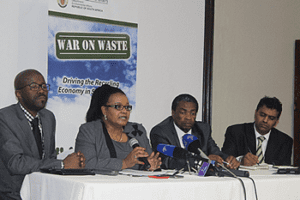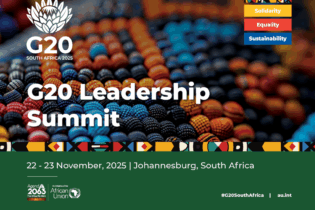Where South Africa has long been a “throwaway” culture, recycling only 10% of garbage produced, new legislation is set to inaugurate a recycling revolution, injecting as much as R50-billion into the national economy – a special report by Frances Ringwood.
The Department of Environmental Affairs on Wednesday concluded a three day summit held in White River, Mpumalanga under the theme – “War on Waste: Driving the recycling economy in South Africa”. The summit is being hailed in the waste sector as the foundation for a radical approach to the waste economy, emphasising recycling as a driver of green jobs. In her opening address, Edna Molewa, Minister of Environmental Affairs said, “if properly managed, the waste management sector could inject over R50 billion in the economy of the country.” She also referenced the National Pricing Strategy for Waste Management, released on 2 February this year for public comment. “This strategy outlines the methodology for pricing of waste streams to ensure that there are funds collected to promote the recycling economy. We all agree that diverting waste from landfill sites requires infrastructure and such must be funded,” said Minister Molewa. According to both government and waste management sector professionals there is tremendous potential in the industry to create jobs as well as stimulating SME and SMME development, in what is being referred to as a “radical socio-economic transformation”.More effective stakeholder engagement
Also addressed at the summit was the elephant in the room: concerns from certain members of industry that the department’s engagement with all role-players has been somewhat lacking in the past. In an effort to foster greater communication between government and the rest of the sector, the DEA-Industry Waste Management Forum has been established. According to Minister Molewa, “The forum is functioning effectively and had since held a total of four meetings, convening on a quarterly basis.” She also extended an open invitation to other members of industry who would like to participate to make the platform all inclusive. A further vehicle implemented for better policy direction in South Africa’s waste is the Committee on Waste Management, which will comprise waste management officials from all national government departments and serve as a forum in line with Waste Act requirements.The first issue under discussion will be improving mechanisms for separation at source, a way to divert waste from landfill, saving valuable space and reducing waste management costs throughout the entire waste management value chain.







